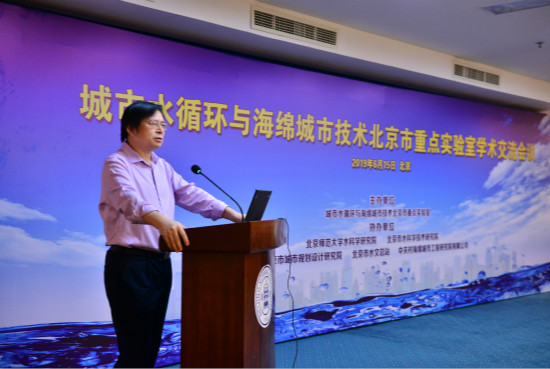On June 15, the 2019 Annual Academic Exchange Conference of Beijing Key Laboratory of Urban Water Cycle and Sponge City Technology was successfully held in Jingshi Building. Lin Bingzhang, Professor of Nanjing University of Information Science & Technology, Cheng Xiaotao, Professorate Senior Engineer of China Institute of Water Resources and Hydropower Research, Xie Yingxia, Professorate Senior Engineer of China Academy of Urban Planning & Design, Lin Binliang, Professor of Tsinghua University, and Cai Dianqing, Senior Engineer of Tongzhou District Sponge City Construction Leading Group Office, were invited to attend the meeting and make academic reports. nearly 80 relevant personnel from five member units of the Laboratory, including teachers and students of our school, attended the Academic Exchange Conference.

Professor Xu Zongxue, Director of the Laboratory, Presides over the Conference

Venue of the Academic Exchange Conference
The Conference was presided over by professor Xu Zongxue, Director of the Laboratory. At the beginning of the Conference, director Xu Zongxue first introduced the leaders and experts who were invited to attend the Conference to the participating laboratory members, and briefly introduced the background and purpose of the Conference. Later, professor Lin Bingzhang introduced a new approach to urban rainstorm design and a visual flood disaster risk warning platform based on the big data analysis of rainstorm, and professorate senior engineer Cheng Xiaotao proposed that the response to flood risk under the background of overall construction of ecological civilization should be transferred from mitigation of damage to mitigation of risk. The report aroused great interest of the participants, and a heated discussion was then carried out on the subject of the report. In the following report of the Conference, professorate senior engineer Xie Yingxia reviewed and summarized the practice of sponge city construction, and summarized the idea of systematic water control based on the sponge city concept, professor Lin Binliang introduced the simulation of the overland flow process of urban underlying surface and the formation mechanism of waterlogging, and finally, professorate senior engineer Cai Dianqing, on behalf of Beijing Tongzhou District Sponge City Construction Leading Group Office, shared with us the construction experience of Tongzhou as a pilot for National Sponge City.

Professor Lin Bingzhang Delivers the Conference Report

Professorate Senior Engineer Cheng Xiaotao Delivers the Conference Report
In the afternoon, the Academic Exchange Conference was divided into two parallel sessions, and participants from five member units respectively conducted academic exchanges around four research fields of the Laboratory. A dozen experts, including vice president Gao Junbin, professorate senior engineer Wang Qiang, professor Hu Litang, senior engineers Meng Dejuan, Li Yongkun and Yang Moyuan, associate professors Pang Bo, Sun Wenchao and Zuo Depeng, as well as engineers Zhang Cen, Lu Yajing and Wang Lijing, made wonderful academic reports in succession. The reports are rich in content and full of climaxes, presenting an academic feast worthy of careful taste.

Group Photo of Some Laboratory Representatives and Experts Attending the Academic Exchange Conference
The success of the Conference not only promoted the academic communication of the Key Laboratory members in the areas of urban rainstorm design, flood disaster warning and management, and sponge urban construction technology, but also promoted the mutual understanding among member units of the Key Laboratory, providing a good opportunity for further exchanges between our school and cooperative units on the basis of consolidating the good cooperative relationship. At the same time, the Conference also greatly stimulated the participants' enthusiasm on the research of urban water cycle and sponge city technology, playing a very important role in promoting the academic influence of the Key Laboratory.